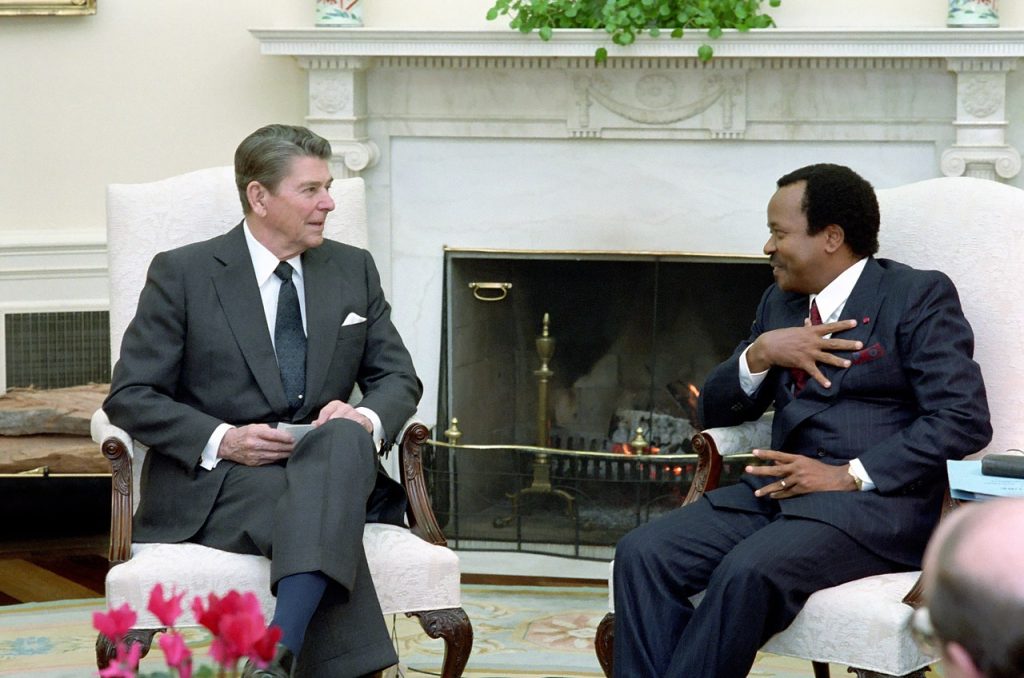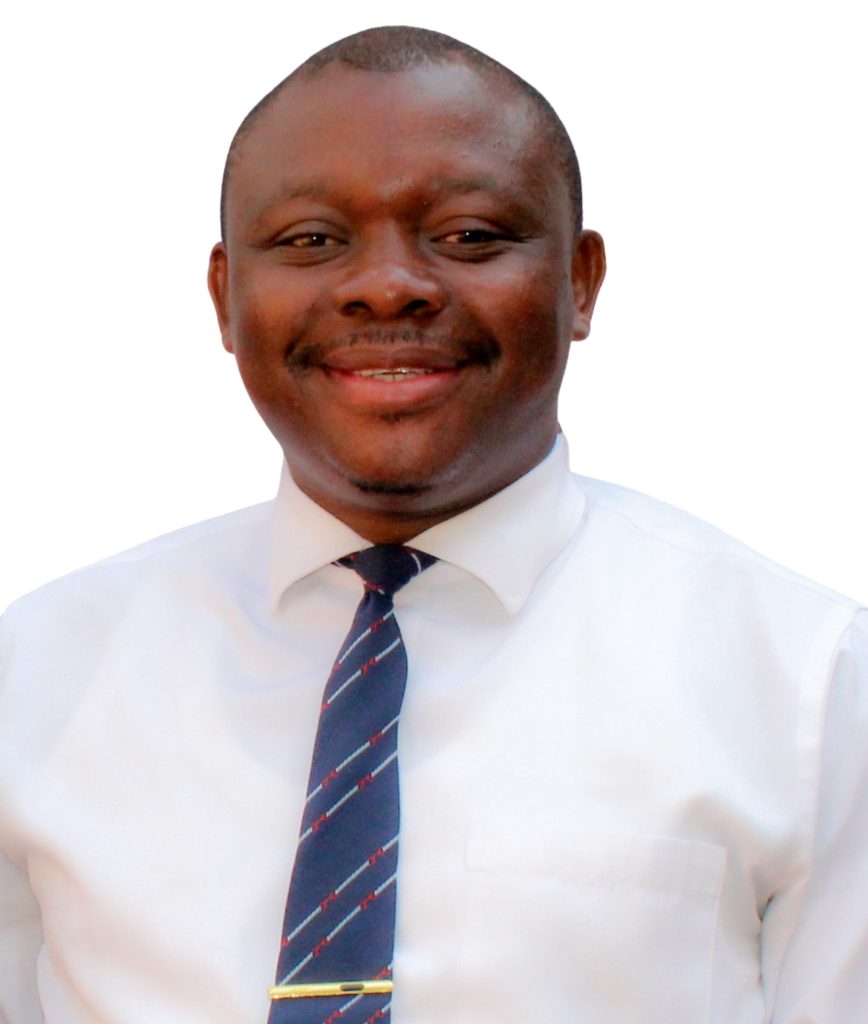Ahead of Cameroon’s Presidential Vote, Paul Biya Is Set to Cement the Democratic Illusion
As Cameroon heads toward its October 12 election, President Paul Biya—the world’s oldest head of state—is seeking yet another term after 43 years in power. His rule has hollowed out democratic institutions, sidelined challengers, and weaponized the law to secure his grip. Opposition parties remain fragmented, while government crackdowns have stifled dissent and muted public protest. What remains is the semblance of democracy—and elections that serve less as a choice than as a ritual to preserve Biya’s reign.
In July 2022, during a state visit by French President Emmanuel Macron, Paul Biya was asked whether he would seek another term. “I still have three years…and when the time comes, I will decide whether to retire to the village or not,” he replied, brushing off the question about his political future. Three years later his decision is clear: Instead of packing his bags and returning to his native Mvomeka’a in the South, Biya—now 92 years of age—will stay in the capital Yaoundé and seek yet another term in office.
And so it happens that as the October 12 presidential vote draws near, Cameroon finds itself at a political crossroads that feels all too familiar. As long as Biya, the world’s oldest head of state, breathes, he rules—irrespective of concerns over his health, age and legacy. Beyond Biya’s bid for another mandate that could see him in power well close to a century old, the real story lies more in the systemic dismantling of opposition forces—an orchestrated effort that has left the central African nation’s democratic institutions hollow and its political future uncertain.
43 years and still counting
Biya’s uninterrupted presidency since 1982 has largely depended on a delicate mixture of autocratic rule, patronage, tactical patience, politics of silence as well as nepotism and tribalism. In over four decades, he has outmanoeuvred rivals, reshaped institutions, and ensured that any path to power—legitimate or otherwise—passes through him. In 2025, the strategy appears unchanged. The recent disqualification of Maurice Kamto, Biya’s former ally, main challenger and runner-up in the contentious 2018 poll, is emblematic of a regime that has turned legal procedure into political weaponry.
Elections Cameroon, the country’s election management body—which is supposedly independent but in fact dominated by presidential appointees—blamed Kamto’s exclusion from the race on “multiple investitures” by the MANIDEM party which nominated him. The decision drew immediate backlash, notably from Human Rights Watch, which said the decision to exclude Kamto reflects the government’s long-standing intolerance for any opposition and dissent. Just before, there was widespread fear the electoral commission’s decision could ignite unrest in major cities like Douala and Yaoundé. But Biya’s administration responded in predictable fashion, borrowing a leave from its playbook: pre-emptive deployments of anti-riot forces, dispersing crowds with teargas and arresting suspected pro-Kamto supporters—all amid vague appeals for stability.
Crackdowns and manipulation
But stability, in Cameroon’s current context, is a deeply misleading term. It masks the profound erosion of civil liberties, the stifling of political dissent, and the lack of political will to reform electoral norms in order to sustain one man’s grip on power. As the Bertelsmann Transformation Index (BTI) 2024 indicates, democratic statehood, political participation, rule of law, political and social integration are on the decline since 2014, putting Cameroon in the category of “hardline autocracies.”
In March 2024, the government banned two opposition coalition platforms—the Alliance Politique pour le Changement and the Alliance pour la Transition Politique—accusing them of unlawful association. By targeting coordination efforts among rival parties, the regime effectively dismantled any chance of a united opposition front, long before the first ballot could be cast.
Meanwhile, the ruling Cameroon People’s Democratic Movement (CPDM) continues to dominate the political landscape, sometimes using state resources and through institutional engineering. The decision last year to postpone parliamentary and municipal elections—originally scheduled for this year before the presidential poll—until 2026 is another glaring example. The official rationale cited the need to lighten the electoral calendar. But it seemed to have been designed to prevent key opposition figure Kamto, who required local representation to qualify under electoral law, from fulfilling eligibility requirements.
Opposition is fragmented, but new players arise
Opposition parties, while numerous, remain fragmented. Political figures like Cabral Libii, Joshua Osih, Serge Espoir Matomba, Patricia Tomaïno Ndam Njoya and Akere Muna failed to unite around a single platform, though a few have now stepped down in support of others. Regional rivalries, ideological differences, and suspicions—fuelled, in some part, by regime infiltration—have made meaningful coordination almost impossible. In the absence of unity, the opposition shares the remaining votes, and its impact is diminished to symbolic protest and social media outrage.
Still, the cracks in Biya’s edifice are growing, with recent defection of prominent northern allies. Issa Tchiroma Bakary and Bello Bouba Maigari, both former cabinet members and longstanding collaborators of the regime, announced presidential bids of their own. Their exit from an alliance with the CPDM is not just an act of defiance; it’s a signal that things may not be the same in the north, which holds a strong sway in the vote. Their candidacies may lack broad support—also due to their ages, but they reflect a growing impatience within the ruling elite, particularly among those sidelined in Biya’s long twilight.
A country in a state of uncertainty
Meanwhile, outside of Yaoundé, the government’s authoritarian playbook continues to have deadly consequences. In the English-speaking North West and South West regions, armed separatists and government forces remain locked in a brutal conflict that has killed over 6,000 and displaced nearly a million people. Thousands have died, schools remain shuttered, and humanitarian access is limited. In the Far North, Boko Haram insurgents persist in attacking civilians and security forces. These crises have not only devastated lives; they’ve also provided convenient justification for voter suppression in regions unlikely to back the ruling party at this time.
Indeed, the state of uncertainty that hangs over these regions is not just a matter of war—it could also be considered as a deliberate electoral strategy. By doing little or nothing to encourage voting in crisis zones which are opposition strongholds, the regime strengthens its numerical advantage.
On the economic front, Cameroonians face both external and internal shocks, especially the burden of inflation and underemployment. With youth unemployment reaching alarming levels, and roughly 40 per cent of the population living below the poverty line, disillusionment is widespread. The median age in Cameroon is just 18, yet the political class—dominated by septuagenarians and octogenarians—remains deaf to the frustrations of a generation born and raised under them.
The gate to power is shut
It’s no surprise then that home-based youth are taking their frustration online, while youth-led protests by the country’s diaspora are common. But Biya’s regime has long perfected the art of deterrence. According to Freedom House, arrests, torture, detentions, and the use of a controversial 2014 anti-terrorism law to criminalize dissent have silenced even moderate critics. The media landscape, too, has been gutted. The Committee to Protect Journalists says journalists face censorship, intimidation, and imprisonment, with Cameroon consistently ranked among the worst countries in the world for press freedom.
And yet, the international community remains largely passive. France, Cameroon’s former colonial ruler, maintains close economic and military ties, while regional institutions like the World Bank, the International Monetary Fund, and the African Union have issued little more than muted statements. Western governments, wary of jeopardizing counterterrorism cooperation, have avoided direct confrontation with Yaoundé. But in doing so, they tacitly endorse a regime that flouts democratic norms while claiming the legitimacy of an electoral mandate.
Cameroon’s hollow future
What makes Biya’s grip on power so enduring is not just repression—it is the illusion of legality. Cameroon holds regular elections. It maintains a multiparty system. It boasts a constitutional council and an independent electoral body. But these structures have been hollowed out, their purpose repurposed to preserve a singular political dynasty. There is no viable path to power that doesn’t first pass through the gate Biya has locked shut.
For all his frailty, Paul Biya is not a relic of a bygone era; he is the architect of a system built to outlast him. His true legacy may not be longevity, but the institutional paralysis he will leave behind. And unless opposition leaders find a way to unify, unless citizens reclaim the democratic space stolen from them, Biya’s eighth term will not be his last.
Published in cooperation with Global South World.
Related Content: In Cameroon elections, anyone but the 42-year Biya regime

